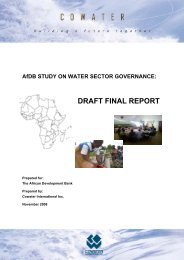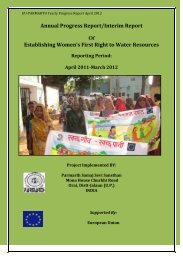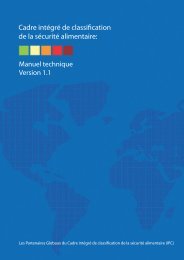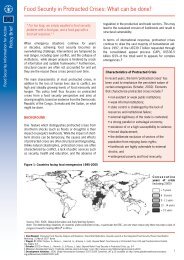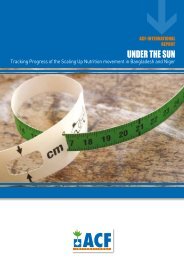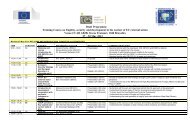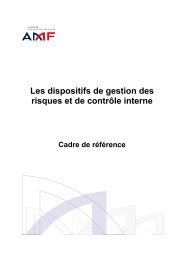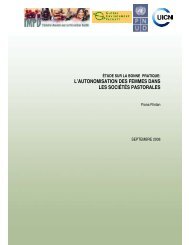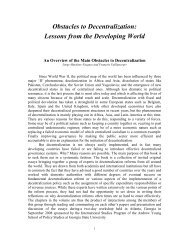Extraction Technologies for Medicinal and Aromatic ... - Capacity4Dev
Extraction Technologies for Medicinal and Aromatic ... - Capacity4Dev
Extraction Technologies for Medicinal and Aromatic ... - Capacity4Dev
Create successful ePaper yourself
Turn your PDF publications into a flip-book with our unique Google optimized e-Paper software.
EXTRACTION TECHNOLOGIES FOR MEDICINAL AND AROMATIC PLANTS<br />
3<br />
Maceration, Percolation <strong>and</strong> Infusion<br />
Techniques <strong>for</strong> the <strong>Extraction</strong> of<br />
<strong>Medicinal</strong> <strong>and</strong> <strong>Aromatic</strong> Plants<br />
Abstract<br />
J. Singh<br />
Techniques of maceration, percolation <strong>and</strong> infusion have been traditionally used <strong>for</strong><br />
making galenicals <strong>and</strong> tinctures from medicinal <strong>and</strong> aromatic plants (MAPs). This article<br />
describes the underlying principals <strong>and</strong> mechanisms of these extraction techniques,<br />
<strong>and</strong> discusses the various modifi cations made <strong>for</strong> the small- <strong>and</strong> large-scale<br />
extraction of MAPs, the factors affecting the extraction process, <strong>and</strong> the quality of the<br />
extracts produced.<br />
3.1 Introduction<br />
Be<strong>for</strong>e the nineteenth century, there was no real progress in<br />
methods of extraction of plant materials <strong>for</strong> industrial use. Nonetheless, the<br />
various classes of preparations involving simple expression <strong>and</strong> extraction<br />
techniques were in vogue <strong>for</strong> a long time <strong>for</strong> the preparation of medicines<br />
used in traditional medicine <strong>and</strong> in complimentary <strong>and</strong> alternative medicine,<br />
practiced throughout the world. The techniques available were limited to expression,<br />
aqueous extraction <strong>and</strong> evaporation; later on, the use of extraction<br />
processes was extended by using alcohol as a solvent. Such techniques<br />
were highly successful in the phytochemical fi eld <strong>and</strong>, consequently, single<br />
pure molecules were isolated <strong>for</strong> industrial <strong>and</strong> medicinal uses. After the<br />
nineteenth century, rapid progress was made in extraction processes which<br />
led to the isolation <strong>and</strong> characterization of many groups of plant metabolites<br />
of therapeutic importance, including both single chemical constituents<br />
as well as st<strong>and</strong>ardized extracts of crude drugs. In manufacturing various<br />
classes of medicinal plant preparations, such as decoctions, infusions, fl uid<br />
extracts, tinctures, semisolid extracts (pilular) <strong>and</strong> powdered extracts, popularly<br />
known as galenicals, both simple traditional methods <strong>and</strong> advanced<br />
technologies are used, con<strong>for</strong>ming to the offi cial procedures <strong>and</strong> specifi cations<br />
as laid down in various pharmacopoeias <strong>and</strong> codices of the world.<br />
Maceration, percolation <strong>and</strong> infusion are the general techniques<br />
used <strong>for</strong> the extraction of medicinal plants <strong>and</strong> are mostly applied<br />
<strong>for</strong> galenical preparations. The sole purpose of such basic extraction procedures<br />
is to obtain the therapeutically desirable portion <strong>and</strong> eliminate the<br />
inert material by treatment with a selective solvent known as menstruum.<br />
These techniques also play a decisive role in the qualitative <strong>and</strong> quantitative<br />
evaluation of the extracts. The st<strong>and</strong>ardized extracts thus obtained are<br />
further processed <strong>for</strong> inclusion in other solid <strong>and</strong> semisolid herbal dosage<br />
67



